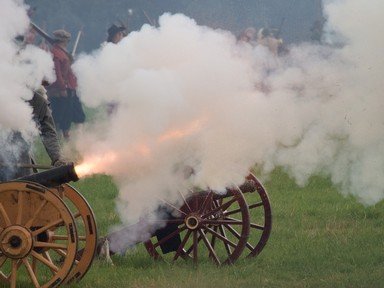Quiz Answer Key and Fun Facts
1. King Alfred the Great defeats the Danes, 878 AD
2. Scotland's Robert Bruce defeats England's Edward II, 1314 AD
3. King Henry V defeats France, 1415 AD
4. William of Orange defeats James II, 1690
5. The last time a British sovereign commanded troops in the field, 1743 AD
6. The American colonies win their independence, 1781
7. Admiral Nelson decisively defeats the combined French and Spanish navies in this 1805 battle, fought near the Strait of Gibraltar in 1805
8. This 1854 Crimean War battle is also known as "the Charge of the Light Brigade"
9. The only major victory for the Ottoman Empire in World War One
10. The major naval battle of World War One
Source: Author
chessart
This quiz was reviewed by FunTrivia editor
bloomsby before going online.
Any errors found in FunTrivia content are routinely corrected through our feedback system.


